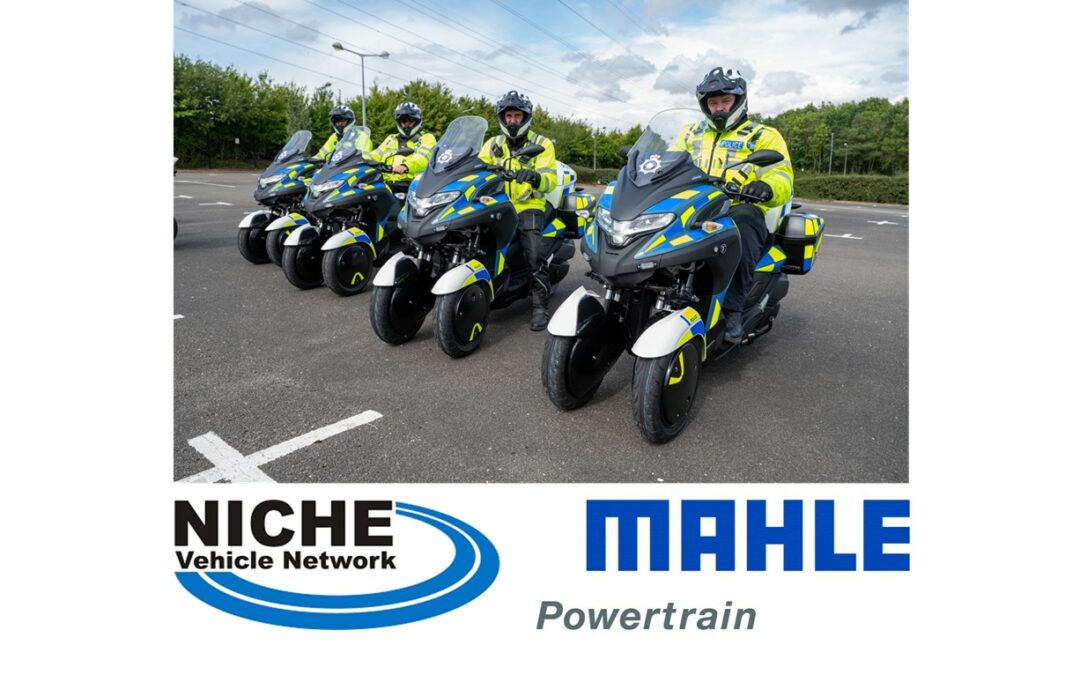- MAHLE Powertrain and White Motorcycle Concepts to develop fully electric three-wheeled motorcycle for police and emergency first responders
- Yamaha Tricity 300-based design will target 100 mile operating range and fast charge time
- Funded as part of the Niche Vehicle Network’s Powered Light Vehicles (PLV) Feasibility Studies competition, the sustainability-focused project will help emergency services achieve their net-zero ambitions
MAHLE Powertrain is working with White Motorcycle Concepts (WMC) to develop a fully electric three-wheeled motorcycle perfectly suited to the requirements of police, emergency first responders and last-mile delivery fleets. Supported by a grant from the Niche Vehicle Network, supported by the Department for Transport and Innovate UK, the project will adapt the design of the Yamaha Tricity 300 to replace its combustion engine with a fully electric powertrain with fast-charging capability and a targeted 100 mile operating range. This development will enable emergency services to comply with forthcoming legislation and achieve their net-zero ambitions without sacrificing service levels.
“Existing electric motorcycles have been designed with the retail market in mind, and can be both expensive and slow to charge,” said Jonathan Hall, MAHLE Powertrain’s Head of Research and Advanced Engineering. “Because emergency services require high levels of availability and have an unpredictable demand, retail electric motorcycles are unlikely to present a cost-effective solution.”
The project will build upon WMC’s success with the WMC300FR hybrid three-wheeled motorcycle, developed in conjunction with Northamptonshire Police and on trial with emergency services across the country. Both it and the forthcoming fully electric version make use of the company’s patented V-Duct, a venturi duct that passes through the centre of the motorcycle that significantly reduces drag, improving performance and efficiency. The concept behind this central air duct has been honed on the WMC250EV that forms the basis for the WMC’s electric land speed record programme.
MAHLE Powertrain will use their simulation expertise to determine the optimal powertrain specification for the requirements. By analysing real-world data in a comprehensively modelled virtual environment, MAHLE Powertrain will investigate a number of components such as traction motors and charger systems to arrive at the best possible configuration. This work will also consider a variety of battery topologies – from traditional slow-charging and low-cost options through to novel ultra-fast technologies – and analyse how best to package these components within the motorcycle. A CAD-based study will also develop a concept that integrates the chosen traction motor and transmission into a new rear swing-arm.
The project’s focus on sustainability is evident beyond the target of delivering zero-emission transport for rapid response fleets, such as in the use of recycled carbon-fibre in the motorcycle’s construction, and the selection of a downsized battery pack with fast charging capability that reduces the use of rare earth materials.
Northamptonshire Police Chief Constable and UK Police lead for Motorcycles, Nick Adderley, said: “The hybrid three-wheels bikes we now have in our fleet are providing an alternative, practical and very visible way for our neighbourhood police officers to get out and about in their communities. We need to continue to ensure we are prepared for the future with a sustainable fleet that not only meets the green agenda but also enables us to deliver the policing service our communities need and want. Our close involvement in these developments ensures the operational vehicle meets our specific requirements and I look forward to seeing the output from this study.”
The electric three-wheeled motorcycle will also serve to make police more visible, which is rapidly becoming a key requirement in community policing, while the completed design can be easily adapted to other services such as paramedic first responders and even last-mile delivery duties. Crucially, the bike can be ridden on a standard car licence, removing the need for specialist training.
Recent testing by the Metropolitan Police has confirmed the motorcycle’s suitability for high-speed work where aerodynamic stability is critical, even when equipped with heavily-laden panniers.
Funded by the Niche Vehicle Network, supported by the Department of Transport and Innovate UK, the feasibility stage of the project is scheduled for completion in March 2023. A follow-up project to develop the prototype units is planned, ultimately leading to small series production.


